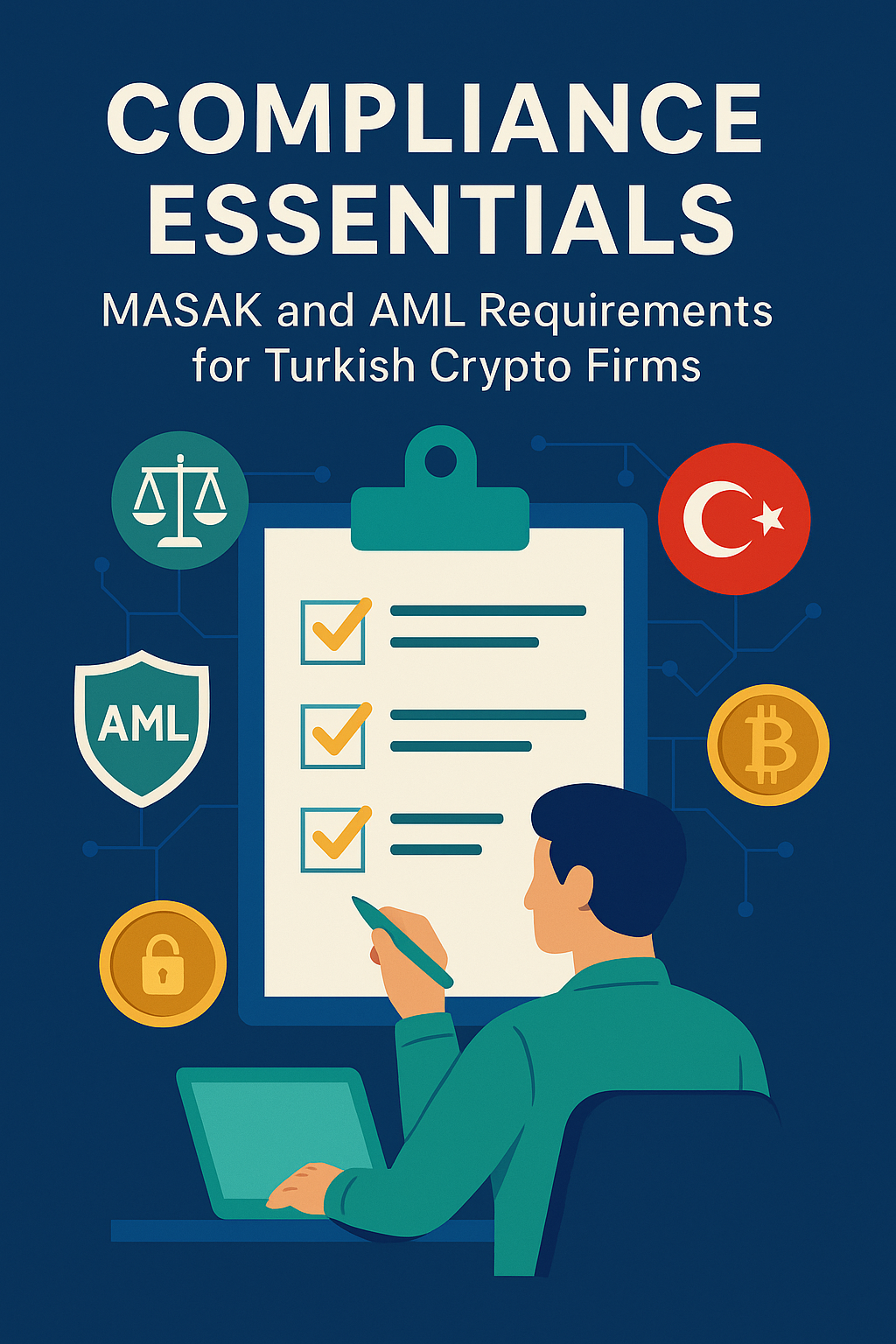Introduction
The cryptocurrency market in Türkiye is booming, but with rapid growth comes heightened regulatory scrutiny—especially in anti-money laundering (AML) and counter-terrorism financing (CTF) compliance. For any crypto business, whether a local startup or a foreign-backed exchange, understanding and implementing MASAK’s requirements is not just a legal necessity; it is vital for survival, banking access, and investor trust. This guide presents practical, actionable insights on AML compliance under Turkish law, helping CEOs and founders navigate the evolving landscape.
1. Who is MASAK and Why Does It Matter?
MASAK (Mali Suçları Araştırma Kurulu), Türkiye’s Financial Crimes Investigation Board, is the central authority for AML/CTF.
MASAK oversees all financial institutions and, since 2021, all crypto asset service providers (VASPs), including exchanges, wallet providers, brokers, and certain DeFi projects operating in or targeting Türkiye.
- Legal Basis:
Crypto businesses are subject to Law No. 5549 on Prevention of Laundering Proceeds of Crime and Law No. 6415 on Countering the Financing of Terrorism, along with relevant MASAK communiqués.
2. Mandatory MASAK Registration for Crypto Companies
Before starting operations, every crypto asset service provider must notify MASAK of their activities.
This is not a licensing process but a formal registration for AML oversight.
- Notification Includes:
- Company formation and registry documents
- Details of responsible compliance officer
- Description of crypto services and business model
- Update Requirement:
Any change in management, activity scope, or compliance officer must be reported to MASAK within 15 days.
3. Core AML Obligations for Crypto Companies
a) Know Your Customer (KYC) and Customer Due Diligence (CDD)
- Identity Verification:
All customers must be identified before any transaction (e.g., Turkish ID, passport, tax number for foreigners). - Beneficial Ownership:
Ultimate Beneficial Owners (UBOs) of accounts must be identified and regularly updated. - Ongoing Monitoring:
Transactions must be monitored for suspicious patterns and unusual activities.
b) Record Keeping
- All records of transactions, customer identification, and compliance reports must be stored securely for at least 8 years.
- Records must be available to MASAK upon request.
c) Suspicious Transaction Reporting (STR)
- Immediate Reporting:
If there is any suspicion of money laundering, terrorism financing, or related activity, companies must submit an STR to MASAK without notifying the customer. - Threshold Reporting:
All transactions over 75,000 TRY (cash, wire, or crypto) must be reported, even if not suspicious, under certain circumstances.
d) Internal Compliance Programs
- Appointment of a Compliance Officer (“Uyum Görevlisi”), approved by company management, responsible for all AML/CTF procedures.
- Development of a formal AML/CTF policy and internal manuals, regularly updated and distributed to relevant staff.
- Annual AML/CTF training for all personnel.
4. Practical Steps for Building a Robust Compliance Program
a) Design a KYC Process Aligned with MASAK Guidelines
- Use digital ID verification, biometric checks, and document scans.
- Cross-reference against national/international sanctions lists (UN, EU, US, Türkiye).
- For corporate clients, require proof of incorporation, shareholder lists, and UBO declarations.
b) Integrate Transaction Monitoring Tools
- Implement real-time monitoring for red-flag behaviors (e.g., rapid in/out flows, use of privacy coins, or structuring transactions to avoid thresholds).
- Utilize software for pattern recognition and risk scoring.
c) Document and Update Policies Regularly
- Maintain a compliance manual, updated for legal changes and new MASAK guidelines.
- Keep audit trails of all decisions and compliance activities.
d) Staff Training and Culture
- Conduct regular training (minimum annually) on AML/CTF obligations, red flags, and reporting procedures.
- Promote a compliance-first culture—reward diligence, and enforce accountability.
5. Regulatory Audits, Penalties, and Enforcement
MASAK conducts both scheduled and surprise audits.
Non-compliance can lead to:
- Heavy administrative fines (hundreds of thousands of TRY per infraction)
- Business suspension or closure
- Criminal prosecution for severe breaches (including up to 7 years imprisonment for money laundering)
- Reputational damage, loss of banking relationships, and investor withdrawal
6. International Context: How Türkiye’s AML Regime Compares
- FATF Compliance:
Türkiye is committed to aligning with Financial Action Task Force (FATF) standards, but remains on the FATF “gray list.” This results in increased pressure on Turkish crypto firms to demonstrate robust compliance. - EU and US Comparison:
Türkiye’s requirements for KYC, STR, and recordkeeping are comparable to those in the EU’s 5th/6th AML Directives and the US Bank Secrecy Act.
7. Special Notes for Foreign-Founded Crypto Firms
- Foreign-owned crypto companies are subject to the same MASAK rules as Turkish entities.
- Appointing a Turkish compliance officer is recommended for efficient communication with MASAK.
- Be ready for enhanced due diligence if foreign shareholders or high-risk jurisdictions are involved.
8. Key Challenges and Practical Solutions
a) Access to Reliable Data Sources
Integrate with governmental ID databases, international watchlists, and banking APIs for effective verification.
b) Cost of Compliance
Budget for compliance personnel, software, and training—it is an investment in your business’s long-term viability.
c) Rapid Regulatory Change
Stay informed via legal counsel, industry groups, and direct contact with MASAK; update your programs proactively.
9. Recommendations for CEOs and Founders
- Make compliance a core business value, not an afterthought.
- Invest in qualified compliance staff and leading AML software.
- Document every step—auditors will ask for evidence.
- Build strong communication channels with both MASAK and your banking partners.
- Be transparent with investors about compliance measures.
10. Conclusion
For crypto businesses in Türkiye, MASAK and AML compliance is not just a regulatory burden, it is the key to sustainable growth, investor confidence, and survival. CEOs and founders who embrace compliance will unlock banking, scale operations, and stand ready for the future as regulations evolve.
Stj.Öğr.Esmanur AKTAŞ

Yanıt yok